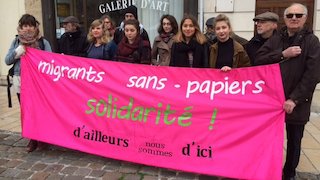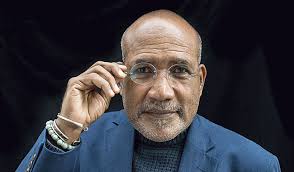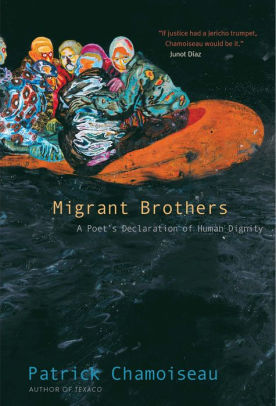In France, social justice groups protesting the government’s restrictive immigration policies have gathered under the collective banner “D’ailleurs, nous sommes d’ici!” The phrase translates as “By the way, we’re from here!” – many of the protesters are immigrants. But “d’ailleurs” may also mean “from elsewhere,” which then renders the banner literally as “From elsewhere, we’re from here!” – but suggests, “Those from elsewhere are the same as those from here.”
 The Martiniquais novelist and screenwriter Patrick Chamoiseau turns the suggestion into a revelation in Migrant Brothers: A Poet’s Declaration of Human Dignity. Approving of the banner, he amplifies and extends its reach: in Chamoiseau’s vision, there is no “elsewhere.” The figure of the migrant is neither an exception nor a discontinuity but rather the harbinger and incarnation of globality:
The Martiniquais novelist and screenwriter Patrick Chamoiseau turns the suggestion into a revelation in Migrant Brothers: A Poet’s Declaration of Human Dignity. Approving of the banner, he amplifies and extends its reach: in Chamoiseau’s vision, there is no “elsewhere.” The figure of the migrant is neither an exception nor a discontinuity but rather the harbinger and incarnation of globality:
“Submitted to economic dogma, precipitated into the immanence of the digital, the human imaginary registers the uncontrollable irruption of the world. Experiences a consciousness of it. Activates a practice of it. While many of us refuse it and succumb to colonialist nostalgias, to sickly racism, to xenophobic worries, to frenzied extremisms (which is also a miserable way of being in the world), others draw from it a quiet benevolence. From this benevolence, this glow, as Pasolini would say, globality is born.”
Chamoiseau tells us that he was encouraged to write Migrant Brothers by “women of action,” journalists and actors and filmmakers who, during a dinner in Paris, told him anxiously about “what was happening on the outskirts of the City of Light.” As an extended declaration, Migrant Brothers exhorts — but it does not hover angelically above the “irruption of the world.” Chamoiseau’s gestures are not pontifical. He strives to provide language that embodies “a consciousness of it” – globality, which is also Relation. His rhythms are rhapsodic, his pitch attuned to ardor more than attitude, his assertions buoyed by telling imagery. The impulsive aim of his prose is not to convince you but to occupy you, to “activate a practice” of experiencing globality and relation through lyrically committed language.
 Chamoiseau, who was awarded the Prix Goncourt in 1992 for his novel Texaco, counts himself among those writers who have worried that writing to promote social justice, especially lyrically, may be feckless. But his fellow Martiniquais, the late Édouard Glissant, led him to the source of a vital approach. Glissant thought “that beneath the facts, beneath the horror, a poetic vision was able to identify the forces at work, and among them to discern the acting power that alone, in the end, would be the key to a decisive response.” In Chamoiseau’s view, the expressive power of the poet channels “another imaginary of the world” identical to the awareness of the migrant – “a particular vision that the exceptional energy of these people secretly possessed.” This is the flaming core of Migrant Brothers: the potential for relation lives within precarity itself.
Chamoiseau, who was awarded the Prix Goncourt in 1992 for his novel Texaco, counts himself among those writers who have worried that writing to promote social justice, especially lyrically, may be feckless. But his fellow Martiniquais, the late Édouard Glissant, led him to the source of a vital approach. Glissant thought “that beneath the facts, beneath the horror, a poetic vision was able to identify the forces at work, and among them to discern the acting power that alone, in the end, would be the key to a decisive response.” In Chamoiseau’s view, the expressive power of the poet channels “another imaginary of the world” identical to the awareness of the migrant – “a particular vision that the exceptional energy of these people secretly possessed.” This is the flaming core of Migrant Brothers: the potential for relation lives within precarity itself.
There is no “progression” in Chamoiseau’s narrative — a state of awareness absorbs today’s news but regards it within a broad, borderless field in which every location is the center. His brief chapters cultivate a single crop that may supply every cuisine. Globality, he insists, is our future. Even so, he incorporates the world’s cruel acts of baseness within himself: “In the human person, barbarity is natural, a background color, either very cold or very hot, sepia or manganese carmine; we weary of it yet we must forever worry about it, we pass through it yet we never surpass it. It is and will forever be within us, lunar solar, solid and available, and forever of an involuntary length right in front of us.” He is not naïve: “If a ‘clear conscience’ can be stupid and vacuous, high conscience is always between fear and trust, between tact and audacity, it trembles in the sense that Glissant envisaged.” Opening up to Relation means anticipating one’s own humanity, clearing a path for its arrival.
 On the other hand, Chamoiseau’s toolkit also contains certain absolutes: “In Relation, no one could or would be able to disappoint anyone else.” And so, the reader must allow for both barbarity and embrace – a condition seen within and drawn from the work of Aimé Césaire as well. One’s open mind and arms will by necessity encounter the chaotic: “This interlacing of the living says to us, as Hölderlin sang, Come into the Open, friend!… It constantly integrates different situations, frequents the desire for the unfamiliar, the presence of a mystery, the taste for a difference … make sure that nothing about the world seems hostile to you, and everything in the world will complete your presence …”
On the other hand, Chamoiseau’s toolkit also contains certain absolutes: “In Relation, no one could or would be able to disappoint anyone else.” And so, the reader must allow for both barbarity and embrace – a condition seen within and drawn from the work of Aimé Césaire as well. One’s open mind and arms will by necessity encounter the chaotic: “This interlacing of the living says to us, as Hölderlin sang, Come into the Open, friend!… It constantly integrates different situations, frequents the desire for the unfamiliar, the presence of a mystery, the taste for a difference … make sure that nothing about the world seems hostile to you, and everything in the world will complete your presence …”
For Chamoiseau, the migrations of people may be caused by war and hardship, but he also believes they are responding to “the secret call of what exists differently.” We who are rooted must respond to the same call: “The impact of the migrants clashes head-on with our old measures to guarantee the dignity of all.” The dispassion of those old measures, born from 18th century philosophical enthusiasms (“The slave trade prospered at a level of consciousness nourished by the Enlightenment”) and kept on life support by neo-liberalism, can’t be disguised: “If societies, institutions, states, levels of consciousness, unprecedented intensities of communication are capable of accepting migrant catastrophes, it’s because the unacceptable already thrives in their daily lives.” But the question of what to do about “rogues” who cause migrant catastrophes (Assad, etc.) remains unaddressed.
Migrant Brothers concludes with “The Poets’ Declaration“ comprising 16 assertions. Here, welcoming the difference embodied in the migrant is to greet and create a space for the mysterious, the disordered, the reordered. To be interrupted by the actual. It is not an easy, tension-less act. It causes one’s extended hand to tremble with trust. Poetry, emanating from the chaotic other side of our lives, thus performs a transport to re-visioning. Here is Chamoiseau’s declaration #2:
“The poets declare that in the indefiniteness of the universe lies the enigma of our world, that in this enigma lies the mystery of life, that in this mystery palpitates the poetry of humanity: none of these can be dispossessed of the others!”
[Published April 24, 2019 by Yale University Press, 144 pages, $12.00 paperback]